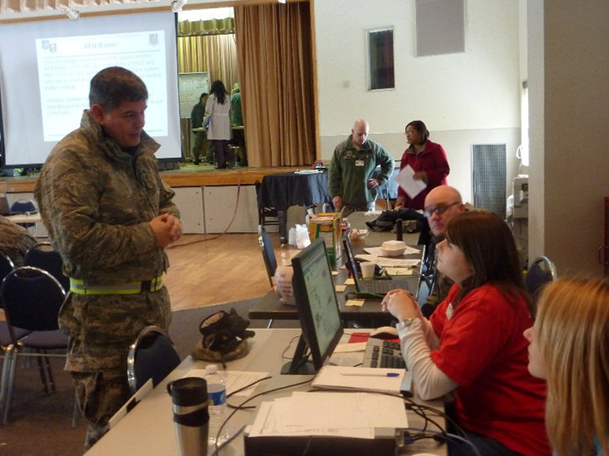Editor’s note: This blog post is written by Kathryn Lasky, a Red Cross volunteer. The one-year anniversary of the Japan earthquake and Pacific tsunami is March 11th.

The Red Cross at the EFACC talking about the Misawa Air Base clean-up efforts with a military member.
At 2:46 pm on March 11, 2011, a 9.0 earthquake rocked northern Japan. At that time, no one knew that it would be the largest to ever strike Japan and the fifth largest in history. Within an hour of the initial quake, devastating tsunamis struck the eastern coast of Japan—overwhelming protective sea walls, sea gates, and supposedly-safe evacuation points. The tsunamis traveled as far away as Hawaii, California, and Oregon.
Even a year later, the events of that day and the days after are still fresh in my mind. As a volunteer for the American Red Cross, I work with Services to the Armed Forces in Misawa Air Base where my husband is stationed, located some 170 miles north of the earthquake’s epicenter. I was working at the Department of Defense’s Women, Infant, and Children (WIC) Overseas program when the disaster struck. At first, I thought it was a minor earthquake, similar to the one we had several days before. However, the shaking became stronger and went on for several minutes. I remember having a hard time standing, helping one of our participants with her children, and comforting children walking home from school. Throughout the night, numerous strong aftershocks occurred. I spent the time checking on the spouses of deployed members from my husband’s squadron and trying to make contact with my family in the states. By the next morning it was finally sinking in, the disaster was much worse.
At Misawa, the role of the Service to the Armed Forces is to support military families through volunteer opportunities, disaster preparedness training, and health and safety classes. Immediately after the earthquake, Misawa activated its Emergency Family Assistance Control Center (EFACC), a central location for information during an emergency that provided access to generator power, telephone lines and internet.
In the days following the earthquake, we registered military members and their families for Safe and Well, a Red Cross website that allows those affected by disasters let others know they are safe, and distributed information through Facebook. Despite the lack of power and heat, people wanted to help the Japanese people affected, so we helped registered volunteers for Misawa Air Base’s volunteer clean-up program, which went out into local communities and helped clean-up the damaged areas.
Another event that stays with me is the birth of my friend’s baby, born three weeks early on March 13, 2011. The hospital was operating on generators during the power outage. There were many aftershocks during that time and at one point, there was a warning of a strong earthquake. I greatly admire my friend, also an American Red Cross volunteer, for her strength because she not only had to deal with giving birth prematurely during a disaster but also did so without her husband, who was deployed.
While Misawa families had the option to take part in the Voluntary Departure order issued by the State Department, I decided to stay because I felt I was and could do more here. I’m glad I did. As the one-year anniversary approaches, I will remember the events in the days and week after. I will remember the new friends I made and how we pulled together to help those affected.
